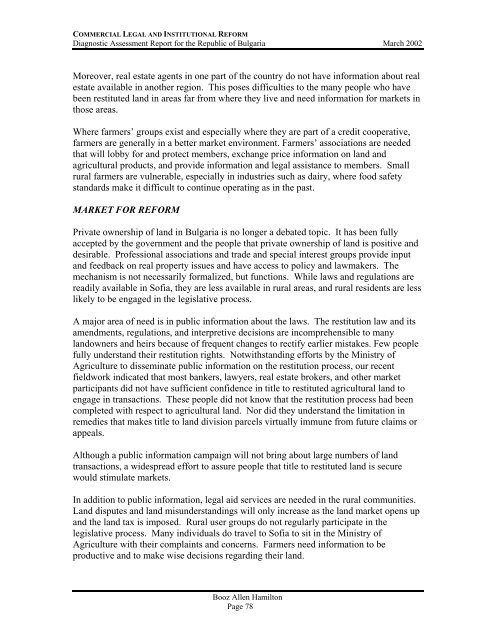Commercial Legal And Institutional Reform (CLIR) - Economic Growth
Commercial Legal And Institutional Reform (CLIR) - Economic Growth
Commercial Legal And Institutional Reform (CLIR) - Economic Growth
You also want an ePaper? Increase the reach of your titles
YUMPU automatically turns print PDFs into web optimized ePapers that Google loves.
COMMERCIAL LEGAL AND INSTITUTIONAL REFORM<br />
Diagnostic Assessment Report for the Republic of Bulgaria March 2002<br />
Moreover, real estate agents in one part of the country do not have information about real<br />
estate available in another region. This poses difficulties to the many people who have<br />
been restituted land in areas far from where they live and need information for markets in<br />
those areas.<br />
Where farmers’ groups exist and especially where they are part of a credit cooperative,<br />
farmers are generally in a better market environment. Farmers’ associations are needed<br />
that will lobby for and protect members, exchange price information on land and<br />
agricultural products, and provide information and legal assistance to members. Small<br />
rural farmers are vulnerable, especially in industries such as dairy, where food safety<br />
standards make it difficult to continue operating as in the past.<br />
MARKET FOR REFORM<br />
Private ownership of land in Bulgaria is no longer a debated topic. It has been fully<br />
accepted by the government and the people that private ownership of land is positive and<br />
desirable. Professional associations and trade and special interest groups provide input<br />
and feedback on real property issues and have access to policy and lawmakers. The<br />
mechanism is not necessarily formalized, but functions. While laws and regulations are<br />
readily available in Sofia, they are less available in rural areas, and rural residents are less<br />
likely to be engaged in the legislative process.<br />
A major area of need is in public information about the laws. The restitution law and its<br />
amendments, regulations, and interpretive decisions are incomprehensible to many<br />
landowners and heirs because of frequent changes to rectify earlier mistakes. Few people<br />
fully understand their restitution rights. Notwithstanding efforts by the Ministry of<br />
Agriculture to disseminate public information on the restitution process, our recent<br />
fieldwork indicated that most bankers, lawyers, real estate brokers, and other market<br />
participants did not have sufficient confidence in title to restituted agricultural land to<br />
engage in transactions. These people did not know that the restitution process had been<br />
completed with respect to agricultural land. Nor did they understand the limitation in<br />
remedies that makes title to land division parcels virtually immune from future claims or<br />
appeals.<br />
Although a public information campaign will not bring about large numbers of land<br />
transactions, a widespread effort to assure people that title to restituted land is secure<br />
would stimulate markets.<br />
In addition to public information, legal aid services are needed in the rural communities.<br />
Land disputes and land misunderstandings will only increase as the land market opens up<br />
and the land tax is imposed. Rural user groups do not regularly participate in the<br />
legislative process. Many individuals do travel to Sofia to sit in the Ministry of<br />
Agriculture with their complaints and concerns. Farmers need information to be<br />
productive and to make wise decisions regarding their land.<br />
Booz Allen Hamilton<br />
Page 78

















